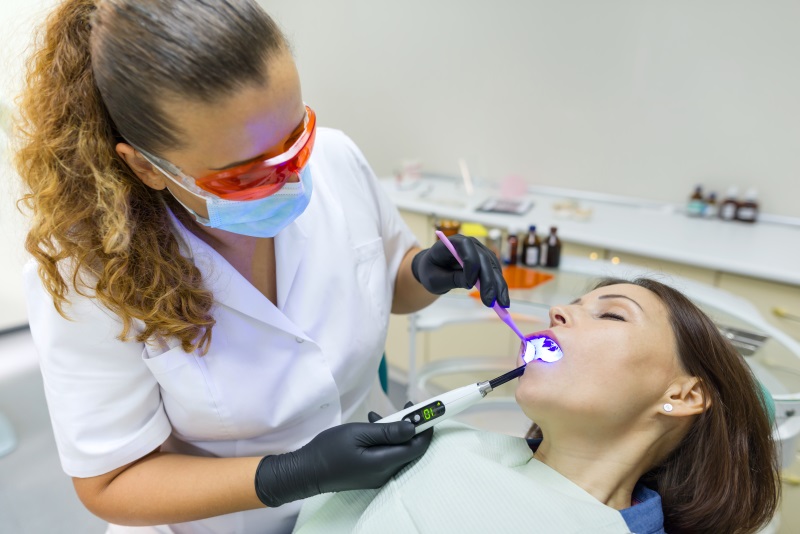The mouth is commonly described as the “window to the body” and your overall health. Did you know that the teeth and gums are sometimes the first indicator that there is a medical problem in another system?
It’s important to remember that your mouth is not a separate entity separate from the rest of your body, rather an intricately intertwined consideration for your total body health. In addition to the mouth highlighting issues with other body systems, problems in your mouth can even cause problems elsewhere in your body. Think of the relationship between total body health and oral health as a two–way street. They both affect the other.
Keep reading as we discuss how our oral health is connected to all aspects of our health.
The connection between mental and oral health
Thanks to mental health awareness and greater transparency and open discussions on the topic, there’s been more research about the connection between oral and mental health in recent years.
The most common mental health conditions that affect oral health are anxiety and panic attacks, depression, eating disorders, obsessive-compulsive disorder, self-harm, schizophrenia and psychosis. The varying severity of these mental illnesses can cause neglect of oral health routines which can lead to tooth decay, gum disease and tooth loss. To read more about the interaction between mental and oral health, read What DentalHealth.org has to say on the topic.
Oral health and small children
You’ve probably heard about babies catching colds or more serious communicable diseases from adults, but what about catching cavities? That seems almost preposterous! However, researcher has shown that adults who transfer salvia to their baby may be also passing cavity causing bacteria. This can occur through kissing, sharing utensils or sharing bites of food. These germs can start the process that causes cavities even before babies have teeth, so it’s important to avoid sharing saliva with your baby right from the start.
Dry mouth
Side effects of medication are the primary cause of dry mouth. Medications such as and anti- histamines and decongestants—both which are commonly used during North Texas allergy season—can cause a decrease in salvia production.
Lack of salvia and severe dry mouth can lead to serious oral and health complications. First, increased plaque, tooth decay and gum disease can occur in patients. Saliva neutralizes bacteria by limiting bacterial growth and washing away food particles. Other complications include mouth sores, yeast infections in the mouth and split, dry skin around the mouth and lips. Finally, saliva enhances a person’s ability to taste, swallow and digest food.
Many of our older patients complain about dulled tastes, which can be tied back to dry mouth. If a decrease in salvia results in difficult chewing and swallowing, a patient’s nutrition could be affected, causing even more problems.
Immune system
If you are experiencing severe dry mouth (and aren’t on any medications that can cause this side effect) then you might be suffering from an autoimmune disease. Most doctors and dentists commonly associate dry mouth with Sjogren’s syndrome, which is caused by the body attacking the glands that make saliva and tears. Prolonged dry mouth can lead to an increased risk of cavities. In addition, Sjogren’s syndrome commonly accompanies other autoimmune diseases such as rheumatoid arthritis and lupus. If you are experiencing extreme dry mouth, it’s important you make an appointment with your dentist or doctor.
Is there a connection between heart and oral health?
Studies have shown that there is a link between gum disease and heart attacks or strokes. It’s thought that, since gum disease is bacteria-caused, it can enter your bloodstream where the bacteria attach to the fatty deposits in the heart blood vessels. This condition can cause blood clots and may lead to heart attacks. In the absence of gum disease, scientists have found there is less bacteria in the heart.
Diabetes and oral health
Periodontal disease is caused by bacteria in the mouth that infect the gum tissue and cause plaque. Poorly managed blood sugar—common in those not yet diagnosed with diabetes—causes damage to blood vessels, which leads to oxygen restriction and nutrition deprivation to the gums and bones. Higher glucose levels in salvia create a breeding ground for bacteria. Weak gums and bone will be targeted by the bacteria and result in oral health diseases.
Concerned about your overall health? The first stop might be the dentist! Give us a call today.
The post How Oral Health Equals Whole Body Health appeared first on Fort Worth Dentist | 7th Street District | H. Peter Ku, D.D.S. PA.


No comments:
Post a Comment